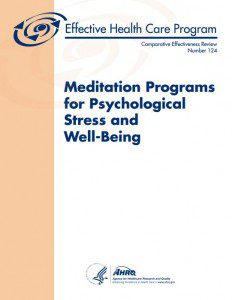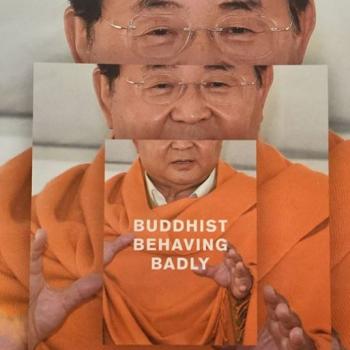This week the US Agency for Healthcare Research and Quality (AHRQ) released a massive meta-analysis on the effectiveness of meditation (variously defined) for a number of healthcare applications. While most news articles point you to the JAMA (subscriber only) link, you can read the entire study for free here (.pdf).
The conclusion of the study will not surprise those who have studied or practiced meditation for any length of time: meditation is a mixed-bag, in terms of definitions, applications, and outcomes. The generalization that meditation is basically a good thing, is supported by the study. However, the truism that meditation doesn’t help with everything is also clearly reinforced. As the authors state in their brief abstract of the 400+ page paper:
Meditation programs, in particular mindfulness programs, reduce multiple negative dimensions of psychological stress. Stronger study designs are needed to determine the effects of meditation programs in improving the positive dimensions of mental health as well as stress-related behavioral outcomes. (p.viii)
Of course you might not guess this based on many of the headlines out there, which stressed the positive outcomes of meditation:
- Mindfulness Meditation Can Help Relieve Anxiety And Depression (NPR)
- Meditation effective in treating anxiety, depression, Hopkins research suggests (Johns Hopkins University)
- Mindfulness Meditation May Ease Depression, Anxiety, Pain (Medscape)
- Mindfulness meditation may ease anxiety, mental stress (Harvard Health Publications)
- Mindfulness Meditation Improves Depression, Pain And Anxiety, Review Shows (HuffPo)
Only one headline that I came across suggested any sort of limitation of meditation practice:
- Meditation Has Limited Benefits, Study Finds (Wall Street Journal)
Unfortunately the study is written in relatively steep psychological jargon, leaving non-experts like myself puzzled by phrases like “The strength of evidence is low that mantra meditation programs have no effect on stress when compared with a nonspecific active control.” (p.70) Why use the negative? What is the strength of evidence that mantra meditation programs have SOME (or HIGH) effect on stress…?
In short, though, there were some significant positive results found in the studies analysed. So an overall positive outlook on meditation is justified. However, any over-generalization of these positive effects is sloppy at best. While there was no reported harm from any of the meditation studies (not all of them assessed harm), there is a growing body of anecdotal evidence that at least some people should not meditate, and certainly not as a substitute for proven psychiatric or pain treatment methods.
Conclusions:
Our review shows that there is moderate strength of evidence that mindfulness meditation programs are beneficial for reducing pain severity, and there is low to moderate strength of evidence that mindfulness meditation programs may lead to improvement in dimensions of negative affect, including anxiety, depression, and perceived stress/general distress. Otherwise, much of the evidence was insufficient to address the comparisons for most of the questions. There were also too few trials of mantra meditation programs to draw meaningful conclusions. There may be many reasons for this lack of evidence.
p.138 (.pdf)
Further discussing their results, the authors cautioned that “Due to the limited number of trials we reported, one should view these conclusions cautiously within the context of the particular population studied, type of meditation program used, and type of comparison used.”
Regarding pain relief, long noted as a benefit of Jon Kabat-Zinn’s MBSR, the study noted that “nearly all of the studies assessing pain focused on musculoskeletal pain populations. None assessed neuropathic pain, and only one assessed a visceral pain.” So while MBSR is rightly said to relieve certain types of pain, it would be irresponsible to suggest that there is good evidence that meditation, in general, or even MBSR specifically, can alleviate or reduce all forms of pain.
Like many studies filtering though often under-staffed publications these days and into blogs and social media, the best thing you can do is take any bold claims with some caution, even (or especially) when they support your existing beliefs. Second, do what you can to get to the source of the information rather than relying on hearsay. If you’re a Western Buddhist you’ll know that the Buddha advised just this in the Kalama Sutta.













